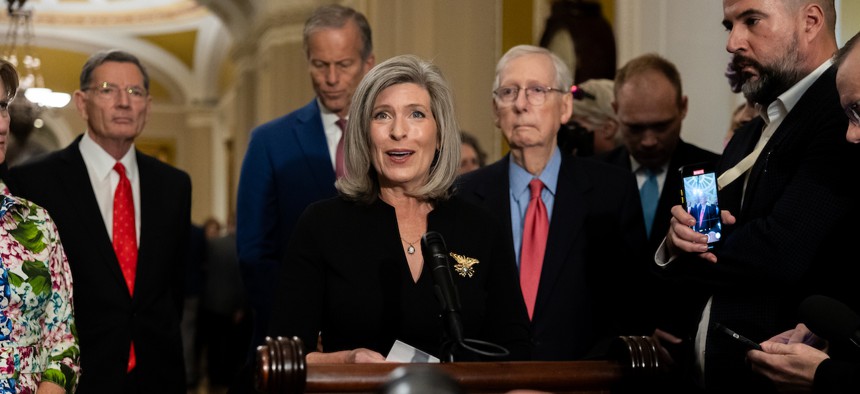
Sen. Joni Ernst, R-Iowa, speaks at a weekly press conference following the Republican policy luncheon at the U.S. Capitol on Sept. 6, 2023. Nathan Posner/Anadolu Agency via Getty Images
If Sen. Ernst thinks veterans are fraudsters, she couldn't be more wrong
COMMENTARY | Criticism regarding potential inefficiencies or shortcomings in teleworking policies should be directed at the policy or system, not the workers who operate within the guidelines provided, writes one veteran.
In a recent press address, Sen. Joni Ernst, R-Iowa, took aim at federal teleworkers, broadly painting them with the brush of "fraud." This sweeping characterization not only undermines public trust in vital federal institutions but also overlooks an essential fact: over 30% of these federal employees are veterans, many of whom might be disabled. As we scrutinize teleworking policies, it is crucial that we don't inadvertently malign our nation's heroes.
It is indisputable that the federal government stands as one of the country's foremost employers of veterans. By casting doubt over the integrity of federal teleworkers, we risk diminishing the reputation of countless veterans who, having served our nation on battlefields, continue their service in government offices. They deserve respect, not unfounded skepticism.
Let's be clear: Constructive criticism regarding potential inefficiencies or shortcomings in teleworking policies is entirely justified. It is crucial for the evolution and betterment of any system. However, such criticism should be directed at the policy or system, not the workers who operate within the guidelines provided. To suggest, even indirectly, that the vast majority of teleworkers, including our veterans, are involved in any form of deceit is not only unjust but also lacks nuance.
Veterans often gravitate toward federal jobs post-military service because of the inherent support and stability these roles offer. For those with service-induced disabilities, telework might not just be a convenience, but a necessity. It's disheartening to see the very system that offers them support in their civilian lives come under attack based on generalizations.
Our veterans have exemplified dedication time and again, be it on the frontlines or behind office desks. Casting aspersions on their commitment when they work remotely tarnishes their service and commitment.
It's imperative that as we critique and work towards refining policies, we consider the broader implications of our words and actions, especially on those who've dedicated their lives to serving our nation. Casting a wide net of blame does a disservice to our discourse and the very heroes who enrich our federal workforce.
In future conversations surrounding telework or any other policies, may our discourse be informed, respectful, and free from broad-brush generalizations. Our veterans, and indeed all dedicated public servants, deserve nothing less.
Michael Embrich is a veteran, former member of the secretary of Veterans Affairs' Advisory Committee on the Readjustment of Veterans, and former congressional staffer.






